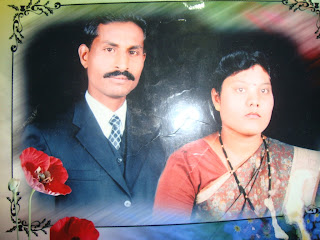KBC’s Fame Vidarbha Farm Widow Aparna Malikar Untold Saga
Varha-kawadha -28th September 2011
Death of husband of vidarbha farm widow who is younger brother of deputy mayor of Nagpur Municipal Corporation (NMC) and Politically very close maharashtra home ministry Aaba Patil, due to distress and despair of successive crop failure and forceful debt recovery of bank can force farm widows to see her father and brother behind the bar and her removal from house before funeral of the diseased debt-trap farmer is untold saga of KBC’s fame Vidarbha Farm widow Aparna Malikar .
‘My husband Sanjay Malikar was cultivating the family owned land since 2001 (see anx.)and he was official cultivator of the land as official revenue record but all income was shared by other brothers Raghunath,Sunil and Raju who are staying at Nagpur but when agrarian crisis started 2005 and cotton economy collapse ,heavy losses in Agriculture change the happy days turned in to gloomy one when debt started mounting creating fresh default with banks(see anx.) and harassment from the family members that forced him to kill himself but tragedy which has not darken by future but he has stuck to parent very badly when Raghunath Malikar used his political contacts and turned case farmers suicide in to culpable homicide lodging the FIR against my father Arun tathe and brother Amol Tathe and me too and police booked offence against us and arrested my father and brother ,they were behind the bar for more than 45 days ,it was not enough for these brothers who forced to out of my house and locked house but decided to live there only occupy the house and land and started cultivating it but atrocities are till continued and my parents are going to court and am also fighting legal battle to get my right of land .after the struggle of survival now I have got the strength and confidence to restart the life hence I joined open university to complete my matriculation .before the help from mega star Abhitabh Bachachan it was helping hand from P.sainath Mumbai and Adv.Amita Joseph New Delhi who helped me start cultivation and education of two daughters now KBC has changed my life but I an scared of past experience and pray the god not repeat the same ’ Aparna Malikar said .
‘when hundreds of vidarbha farm widows shared their experience this is common problem and serious plights farm widows of early 30s as most of widows are denied the land right and blamed for the suicide of husband and forced to leave the house ,if they are fighting for their legal land right they subjected for the severe atrocities and life is made miserable and civil society is mare spectators is most of cases hence we are demanding the proper rehabilitation and protection to all farm widows who are facing the similar problem like me.KBC can focus problem one Aparna but what about thousand of Aparnas who are dying before the death ’Malikar added.
‘when BigB asked ,you are widow but till you are wearing ‘Mangalsutra’ ,my answer was to protect from society this is must ,he was shocked and touched but I was cool as this was simple question for me and for all widows who lost husband in early 30s as well. KBC has given the opportunity to civil society to respond to answer and we are victims of the decision of our father to select farmer as our life partner when we are told that India in last decade more than two lacs fourty thousand farmer killed themselves and vidarbha has been farm suicide capital of India ,I will request all parents not marry their beloved daughter to cotton farmer of vidarbha to avoid humiliation, gloom and despondency and jail too.’ Aparna urged.
‘The joy of being celebrity of KBC was short-lived when VJAS activist came to house in night and told me that Raghunath Malikar has claimed that his younger brother was not farmer and he was never debt-trapped asked me more over he also informed that I am widows too ,Activist asked me give all papers and bank notice copy too which I gave him, we are now very much scared as I don’t want any more police custody to father and brother and I want live peaceful life with two daughter even without KBC price money ’ Aparna Malikar urged media persons who made his life miserable after KBC news released .








